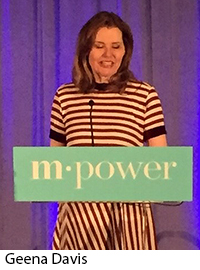
At mPower Event, Geena Davis Confronts Gender Bias
WASHINGTON, D.C.–Actor (don’t call her “actress”) Geena Davis says her various movie and television roles have given her insights into any number of contemporary societal issues–not the least, gender roles and unconscious bias.
 “The problems of unconscious gender bias go deeper than any of us can imagine,” Davis said here during the mPower luncheon at the Mortgage Bankers Association’s Annual Convention & Expo. “We are enculturing–generation after generation–the lack of representation of women in virtually every profession because of the message we are sending: that women and girls are far less valued than men and boys.”
“The problems of unconscious gender bias go deeper than any of us can imagine,” Davis said here during the mPower luncheon at the Mortgage Bankers Association’s Annual Convention & Expo. “We are enculturing–generation after generation–the lack of representation of women in virtually every profession because of the message we are sending: that women and girls are far less valued than men and boys.”
Davis’s 40-year acting career includes an Academy Award for Best Supporting Actress in The Accidental Tourist (1988), an Oscar nomination for Best Actress (Thelma and Louise, 1991) and a Golden Globe for Commander-in-Chief (2005), the first television depiction of a female President. She is also known for iconic roles in A League of Their Own (1992) and Beetlejuice (1988), as well as a recurring role in Grey’s Anatomy.
And while she stays busy as an actor, for nearly two decades she has made early childhood roles her “cause.” In 2004, while watching children’s television programs and videos with her daughter, she realized quality female characters were “few and far between.”
Working with the Annenberg School for Communications at the University of Southern California, Davis sponsored a research project on gender in children’s entertainment. The study, directed by Stacy Smith, showed nearly three males to every one female character in the nearly 400 G-, PG-, PG-13- and R-rated movies. It found characters in the workplace were 80.5 percent male and only 19.5 percent female. Furthermore, Davis said, “only 29 percent of all speaking characters are female,” and these women are more sexualized than the men.
Armed with these data, Davis began visiting movie and television studios. “They were shocked,” she said. “But then they would say that they’ve ‘fixed it.’ But they hadn’t.”
In 2005, Davis partnered with a non-profit group, Dads and Daughters, to launch a venture dedicated to balancing the number of male and female characters in children’s television and movie programming. And in 2007, she launched the Geena Davis Institute on Gender in Media, a program that works collaboratively with the entertainment industry to dramatically increase the presence of female characters in media aimed at children and to reduce stereotyping of females by the male-dominated industry.
Davis noted by 2016, her organization found increasingly more female leads in movies than in previous years. She said nearly 70 percent of the film companies they’ve worked with have changed two or more of their projects” to include more female representation. Still, “most movie roles for women are still eye candy,” she said. “However abysmal the gender gap is in real life, it’s more pathetic on film.”
Davis urged parents to watch TV with their kids. “Kids absorb stuff and think it’s real,” she said. “I would watch shows with my kids and lean during a show and say, ‘Did you notice how few girls there are in that scene?’ or ‘Why do you think she’s wearing that when she’s about to do something?’ It helped my kids interpret reality.”
More importantly, Davis said, girls need to see more positive role models. In 1996, she watched the archery competition during the Summer Olympics in Atlanta and got inspired. At age 41, she took up archery; in 2000 she nearly made the Olympic team.
Twelve years later, Davis observed another spike in interest in archery, inspired by two movies: The Hunger Games and Brave, both of which featured female archers as leads. “This exemplifies the influence of strong female leads,” she said. “It made me realize the enormous influence that media has and how we can play a role.”
Davis said much work remains–not just in Hollywood, but throughout the U.S. “We can’t snap our fingers and boom, Congress is half women,” Davis said. “There is one way we can fix it–television. One show can be gender-balanced, and it makes a difference. We can make a difference by what people see. How do we get more women CEOs? We can change it by what they see on screen…if she can see it, she can be it.”
All of us are agents of change,” Davis added. “Awareness is a cure. Awareness can give us the decision-making power to make a difference. Think of how our kids would be if we raised them with unconscious bias-instead, we are raising another generation of children who have unrealistic ideas about how boys and girls can be.”
